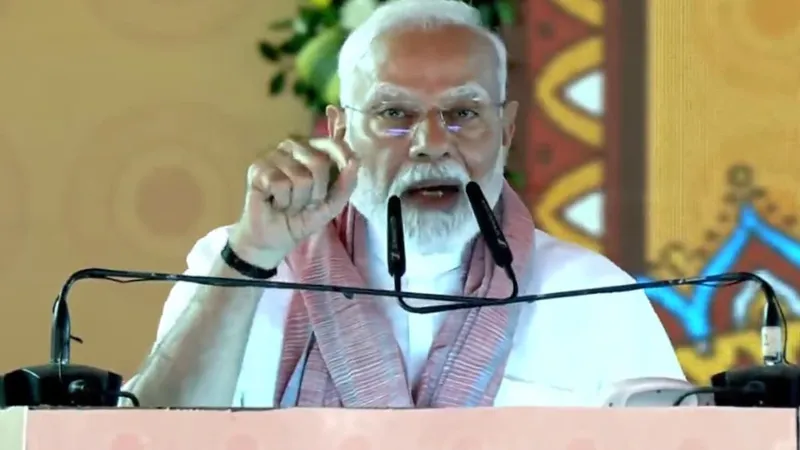Srinagar, April 27, 2025 – The picturesque meadows of Pahalgam, a jewel in Kashmir’s tourism crown, remain scarred by the April 22 terror attack that left 26 dead, mostly tourists soaking in the valley’s serene beauty. Gunmen, clad in military-style uniforms, stormed Baisaran meadow, a hiking hotspot in Anantnag district, unleashing chaos that shattered India’s narrative of restored calm in the region. Today, Prime Minister Narendra Modi doubled down on his promise of retribution, while Karnataka Chief Minister Siddaramaiah stirred controversy by dismissing war rhetoric.
In his monthly Mann Ki Baat radio address, Modi’s voice carried a raw edge of fury and resolve. He called the attack a “conspiracy” by terrorists and their backers to derail Kashmir’s budding peace. Schools were buzzing again, colleges thrumming with students, and tourists flocking to the valley—until the gunfire tore through. “The blood of every Indian is boiling,” he said, vowing that the perpetrators would face the “harshest response.” He didn’t mince words: those behind the carnage would be hunted “to the ends of the earth.” Modi’s words echoed his earlier meeting with National Security Advisor Ajit Doval and External Affairs Minister Subrahmanyam Jaishankar, where he signaled a no-mercy approach.
The attack, one of the deadliest since 2019, has spiked tensions with Pakistan. India’s pointed finger at its neighbor prompted swift diplomatic fallout. On April 23, India suspended the 1960 Indus Waters Treaty, a move Pakistan labeled a potential “act of war.” By April 24, India revoked visas for Pakistani nationals, with 537 crossing back through the Attari-Wagah border by April 27. Modi’s government also downgraded diplomatic ties, while Pakistan shuttered its airspace to Indian flights and halted trade.
On the ground, Indian security forces are in overdrive. The National Investigation Agency has taken the reins of the probe, identifying four terrorists: two Pakistanis, Ali Bhai alias Talha and Asif Fauji, alongside locals Adil Hussain Thoker of Anantnag and Ahsan of Pulwama. A fifth, Hashim Musa alias Suleiman, a Pakistani active in the valley for a year, is suspected of ties to Lashkar-e-Taiba’s proxy, The Resistance Front, though the group denied involvement. Eight houses linked to suspected terrorists, including those of Ehsan Ul Haq Sheikh and Zakir Ahmad Ganai, were demolished across Pulwama, Kulgam, Shopian, and Kupwara. Hundreds have been detained in a sweeping crackdown.
Global leaders have rallied behind India. U.S. President Donald Trump, in a call with Modi on April 23, condemned the attack and pledged support. Saudi Arabia, the UAE, Iran, and Jordan also voiced solidarity, with Modi fielding calls from over a dozen world leaders. Yet, Pakistan’s defense minister demanded an international probe, and its government offered cooperation with “neutral investigators,” a proposal India has so far ignored.
Meanwhile, Karnataka’s Siddaramaiah sparked a firestorm with his remarks on April 26. Speaking to reporters, he accused Modi of “fooling people” with war talk, insisting the attack stemmed from security lapses. “There’s no need for war,” he said, urging tighter measures instead. The BJP pounced, with spokesperson Shehzad Poonawalla slamming Congress leaders for allegedly giving Pakistan a “clean chit.” Siddaramaiah later clarified he meant no conflict was necessary, emphasizing cooperation in deporting Pakistani nationals from Karnataka.
Protests have erupted globally. In Kathmandu, Nepali youths mourned Sudip Neupane, a 27-year-old killed in the attack, picketing Pakistan’s embassy with slogans like “Punish the terrorist.” In London and Paris, Indian diaspora members rallied, though a viral video showed a Pakistani official making a throat-slitting gesture at protesters outside the Pakistan High Commission in London. Back in Kashmir, a candlelight march along Dal Lake reflected local outrage, with former Chief Minister Omar Abdullah noting residents’ spontaneous stand against terrorism.
The attack has gutted Kashmir’s tourism. The Kashmir Hotel Association reported an 80% cancellation rate for bookings, a blow to a region banking on visitors. As security forces comb the valley for terror networks, the meadows of Pahalgam, once dubbed “Mini Switzerland,” lie quiet, haunted by the echoes of gunfire.
Indian officials report intermittent small-arms fire across the border with Pakistan on April 24, 25, and 26. The National Investigation Agency is collecting forensic evidence at the attack site. Jammu and Kashmir police released sketches of the terrorists on April 23.

